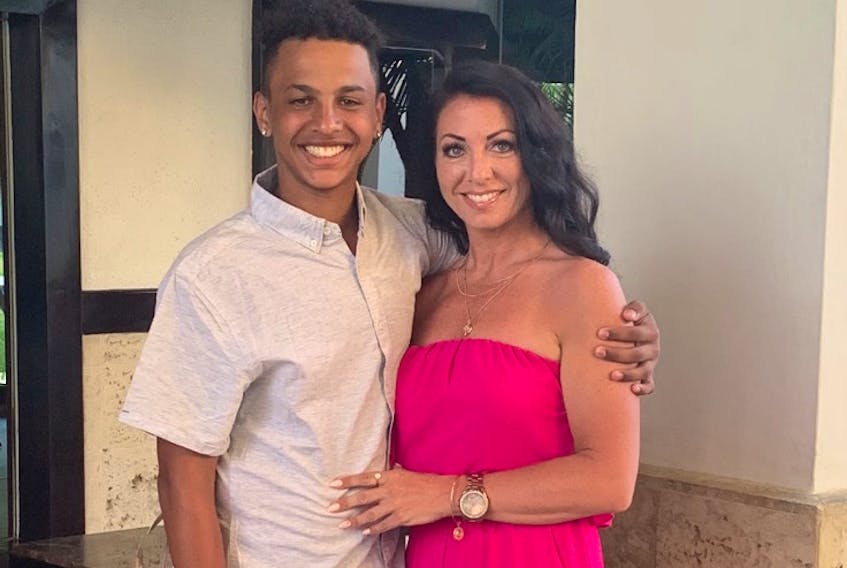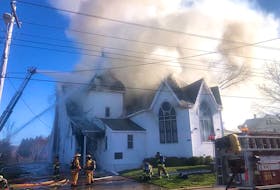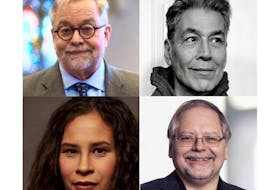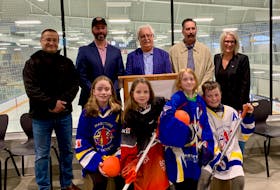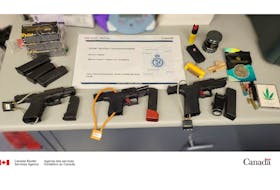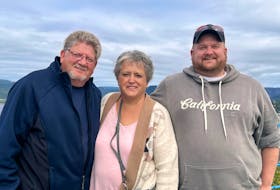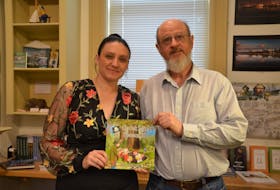ST. JOHN'S, N.L. — In 1995, when she was 15, Jackie Janes moved from Gambo, which had a population of approximately 2,800 at the time, to Nova Scotia, enrolling in a high school with a student body of almost 2,000.
It was her senior year.
Janes stayed in Nova Scotia to attend university in Halifax, eventually graduating with a degree in commerce.
A year later, she gave birth to her son, Jalen.
“I was definitely nervous bringing him home to meet my family, because I wasn’t married,” she said. “My family is very Irish Catholic. We grew up going to church, so I had concerns.
“And of course, I had concerns because my son was mixed race.”

Nevertheless, Janes returned to Gambo with her two-week-old baby.
“The minute I arrived (at) my grandparents’ house, my grandmother just immediately took him in her arms and (said) she just couldn’t believe how beautiful he was,” she said.
As she speaks of her grandfather, Gus Kelly, her voice takes on a noticeable vibrato.
“I was nervous to approach him, and he just embraced me so tight and immediately said those words,” she said.
As he sat in his rocking chair hugging her, he said, “Good job on mixing up the blood. It’s about time someone did.”
"I had concerns because my son was mixed race.” — Jackie Janes
From there, it wasn’t fear she felt, only courage and pride.
“They’re not perfect (words),” Janes said. “But I knew what he meant, and I knew how proud he was, so it just made everything OK.”
After George Floyd was killed by police during an arrest in Minneapolis last month, Janes wanted to write about her experience as a white Newfoundlander raising a Black son.
“I was scared, because (they weren’t) perfect words, and I didn’t want the backlash,” she said. “My best friend, she is Black, and I read it to her and she said, ‘You have to post this.’”
Although there was no shortage of stories about the racism her son has faced in his 16 years, her Facebook post chose to focus on her family’s love.
Janes finished the post by saying, “My family knows that Black Lives Matter. RIP Gus Kelly.”
Her grandfather had died in March 2015.

When Jamie Simudzai Keats was born in Cape Town, South Africa, his father, Derek, refused to mark a racial category on his birth certificate.
His father is from Gambo, and his mother, Esther, is from Zimbabwe. But growing up, he didn’t think much about being in a mixed-race family.
“I really wasn’t conscious of racism and of this hatred that people have until I was 16,” he said.
While shopping for a suit with his mom and sister, Keats saw a man with a broken arm just staring at him.
“He never said anything, he never did anything, I could just feel the look,” he said. “I started to realize there’s people that have these crazy ideas.”
Keats was born in 1989, five years before the end of apartheid, the system which codified racial segregation into South African law, causing vast disparities between racial groups, with the white minority benefitting, to the detriment of all other races.
His father, a marine biology professor, would sometimes place himself at the front of student protests, knowing because he was white, he was less likely to be shot at.
“A Newfoundland guy getting tear-gassed in Cape Town, protesting against apartheid, (it) sometimes boggles my mind,” Keats said.
“He never said anything, he never did anything, I could just feel the look." — Jamie Simudzai Keats
One part of how Keats experienced his Newfoundland and Labrador roots was through a book of jokes his dad owned, written by a Newfoundlander.
“Nowadays, those jokes are probably not politically correct,” he said. “But they also went to the heart of the culture.”
His dad taught him about Newfoundland and Labrador culture by taking him ice skating and out in boat.
“I pretty much had the same kind of childhood that anyone would have in Newfoundland, but in South Africa.”
Today, Keats resides in Halifax, but he did get to spend some time in Newfoundland and Labrador, having moved there in 2017.
“It was a very, very profound experience,” he said. “Especially the (skateboarding) community. They really took me in.”
It didn’t matter what race he was, or where he was from, he said. It was just about skateboarding.
And when he saw other mixed-race kids here, he says his life made a lot more sense.
“I really understood, man, this is where I’m actually from,” he said.

Still, Keats knows there is racism in this province.
And so does Trent McClellan.
McClellan, a stand-up comedian and cast member of "This Hour Has 22 Minutes," grew up in Corner Brook, but now lives in Alberta.
“(My family) would be mixed-race, except the fact that I was the only Black person in the family,” he said. “It’s not one of those ones where you got your kid, and your Black dad is around, or your Black mom is around, and one of the other parents is white. … My biological mom, her grandparents ended up raising me.”

McClellan, born in 1972, says being raised by people so much older than other parents as well as being the only kid with an afro, meant he would often be the centre of attention, whether he wanted to be or not.
“I absorbed that pretty early,” he said. “If I’m going to walk into the room and you’re all going to stare at me anyway, then I might as well control why you’re staring at me.”
Through comedy, McClellan was able to take that power back, as well as diffuse any tense situation.
“It was almost a means for survival,” he said.
To his close community and friends on the street, he was just Trent — a guy with whom they rode their bikes or played street hockey.
“But I did experience racism for sure,” he said. “There were kids who, you know, (the) N-word was not a hard thing to come out of their mouth.”
Thinking about it now, he says it’s amazing those kids even knew that racial slur.
“There was no Internet at the time, (but) you’re learning that word from somewhere,” he said. “Where’d you get the word from? Someone must have taught it to you.”
In the past couple weeks, McClellan has been having a lot of conversations about race and racism, even though it sometimes can be difficult.
“I think a lot of people believe it just doesn’t exist in (Newfoundland and Labrador), that it just doesn’t happen,” he said.
“It’s there. It’s been there a long time, it’s just that you wouldn’t be around to see it.”
Twitter: @AndrewLWaterman

